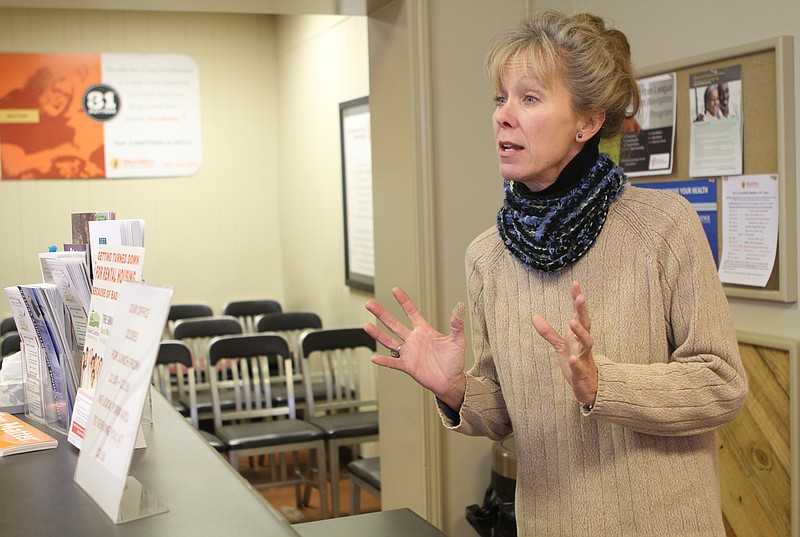To get involved
Contributions to MetMin can be made through its website — met-min.org — or by calling 423-624-9650.
Since early August, the city of Chattanooga has disconnected water service to more than 400 of its citizens and commercial customers.
They haven't paid their sewer bills.
Many can't pay their sewer bills.
This 400-citizen water cut-off is part of the city's sewer problem, a quiet crisis affecting thousands of Chattanoogans and involving many of our major urban issues: poverty, homelessness, nonprofit aid, government policy.
Across the city, sewer customers - both residential and commercial - owe millions of dollars in past-due sewer debt.
For many of our most vulnerable, the cycle out is inescapable: sewer bills too high to pay down, which leads to water cut-off, then eviction, then homelessness.
Not long ago, I asked Mayor Andy Berke to comment on this situation.
His response?
You won't believe it.
But first, the nuts and bolts of the sewer situation.
There are about 70,000 active sewer customers in Chattanooga, said city Treasurer Theresa Lee. (She spoke to me for the Aug. 6 column "The Stench of our Sewer Bill Crisis.")
At the time, some 6,400 accounts were past due, with overdue bills ranging from $250 to more than $2,000.
Add it all up? The city is owed nearly $4 million in uncollected sewer debt.
"Approximately $3.9 million," Lee said. "However, this includes those commercial accounts with rather large monthly bills, so that inflates the number."
The debt went uncollected for too long; once the city reclaimed the billing process from a California company, it began tougher policy last winter. Robo calls. Followed by letters that threatened water-off.
Then, water cut off.
Since January, the city has issued about 1,500 disconnect orders. (Tennessee American Water Co. does the actual disconnection.)
Yes, the city allows a restorative payment plan. Customers can pay off debt over nine months.
But only over nine months. Not 24. Not 48.
Many of these debtors are critically poor, some owing more than $1,500 in sewer debt. It's an outlandish fiction, believing that such debt can be repaid over nine months. Especially when landlords won't fix leaks. Or all the money's eaten up by medical bills. And rent. And lights. How do you pay off $1,500 in sewer debt when you only earn $800 a month?
"It's made their bad situations worse," said Rebecca Whelchel of Metropolitan Ministries. "The elderly, including veterans, are hurt the most. In every case, the most vulnerable families and individuals, all striving to reach or maintain stability, have become more dangerously close to losing their housing."
Each week, Whelchel sees these folks - veterans, families, elderly - asking for help. Since January, MetMin's paid $23,908 to the city's Waste Resources Division on behalf of 207 households.
Why doesn't this have the attention of the City Council?
And City Hall?
A few weeks ago, I emailed the mayor four questions:
-At what point did you know there was a sewer debt of $4 million?
-If much of this debt hits poor people the hardest, would you consider increasing the pay-off period to 24 or 36 months?
-How do you plan to reconcile your anti-poverty philosophy as mayor with this sewer collection practice that makes it even harder for low-income Chattanoogans to survive?
-How many water cut-offs has the city issued since August?
Two weeks later, spokeswoman Marissa Bell emailed a response to the last question.
"431 Accounts have been disconnected since 8/6/2017," she emailed.
But the mayor?
Berke had nothing to say.
"I don't have any comment to add from the Mayor," Bell said.
It's hard to believe, such silence. Since the start of his candidacy, Berke has consistently pledged transparency and an anti-poverty ethic. Here's an issue that affects thousands of Chattanoogans, many of whom live in poverty. It seems perfect for him to tackle, especially as he considers a U.S. Senate campaign.
Why such no-comment silence?
"I'm not surprised," Whelchel said.
Every day, Whelchel sees the people so many of us try to forget. The exhausted families. The traumatized veterans. The bone-weary elderly. For them, a $800 sewer bill is just one more nail in an early coffin.
She also sees the routine way this city can move heaven and earth to consider building a new stadium. Or a downtown park. Or a luxury hotel. Or offering millions in tax incentives to companies.
Why do some have it so easy? And others, so hard? It reminds her of a quote often attributed to Gandhi.
"The true measure of any society can be found in how it treats its most vulnerable members."
David Cook writes a Sunday column and can be reached at dcook@timesfreepress.com or 423-757-6329. Follow him on Facebook at DavidCookTFP.

